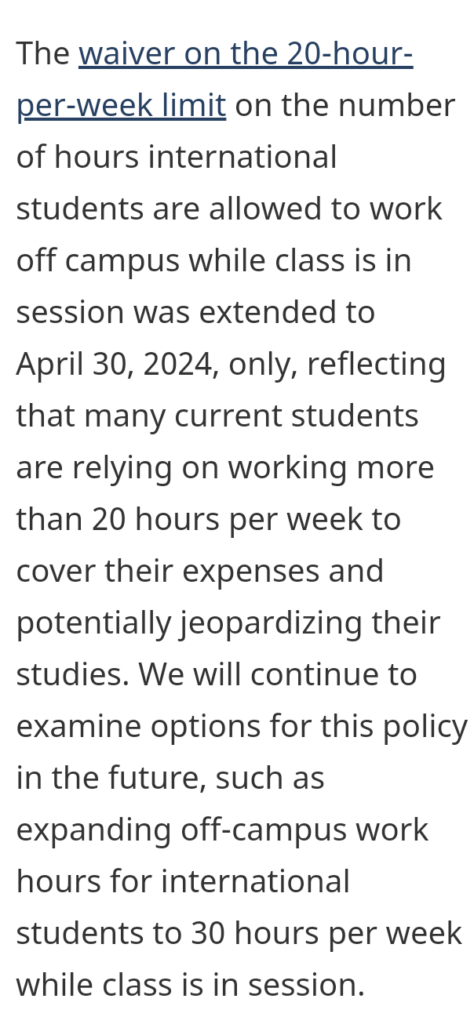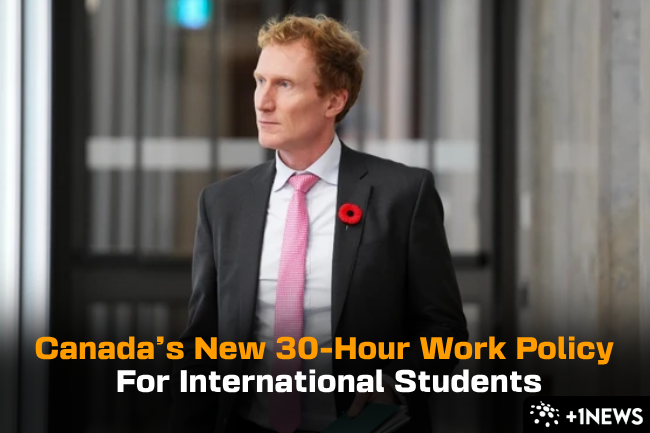Canada’s Immigration Minister Marc Miller recently made several changes to the international student program to make it better in 2024.
Starting from January 1, 2024, the cost of living in Canada for international students will go up. Also, students will need a provincial attestation letter (PAL) from a province or territory.
These changes are meant to help future international student groups. However, some students planning to study in Canada don’t like the new rules for post-graduation work permits (PGWP) and spousal open work permits (SOWP).
We understand that people have different opinions about these changes. But there’s some good news too. The Immigration Minister, Marc Miller, said that the full-time work policy for eligible students will continue until the end of April 2024.
This is because many students need to work more than 20 hours a week to pay for their expenses. The government is also thinking about letting international students work up to 30 hours a week, looking for other ways to help them.
Jump to:
Who Can Work Full-Time Until April 2024?
Former immigration minister Sean Fraser made a rule that lets international students work more than 20 hours a week while they study. There is no limit on how many hours they can work, but there are some conditions they need to meet.
To work full-time, international students must meet specific criteria. Not everyone qualifies for this, so it’s important to check if you meet the requirements.
Only study permit applicants who meet the criteria below can apply or are eligible until April 30, 2024.
If you sent your study permit application (or extension) to IRCC by October 7, 2022,
If any of the following situations apply to you, you can work off-campus for more than 20 hours per week between November 15, 2022, and April 30, 2024:
- You’re a full-time student at a DLI with a study permit (or part-time if it’s your last semester).
- Even if your study permit has expired, you’ve maintained your status and are enrolled full-time (or part-time if it’s your last semester) in classes at a DLI.
In addition, you must meet all of the following requirements:
If IRCC received your study permit application (or extension) between October 8, 2022, and December 7, 2023,
If any of these situations apply to you, you can work off-campus for more than 20 hours per week between January 1, 2024, and April 30, 2024:
- You’re a full-time student at a DLI with a study permit (or part-time if it’s your last semester).
- Even if your study permit has expired, you’ve maintained your status and are enrolled full-time (or part-time if it’s your last semester) in classes at a DLI.
If you applied for a study permit or extension to IRCC after December 7, 2023, you cannot work more than 20 hours.
Will Canada let international students work 30 hours a week?
The changes by Immigration Minister Marc Miller for international students may be a bit tough, but they’ll benefit everyone, including the students.

Canada is putting a limit on the number of international students each year. This means fewer temporary residents, as they’re also making post-graduation work permits (PGWPs) and spousal open work permits (SOWPs) less available.
So, increasing international students’ work hours from 20 to 30 might help make up for fewer SOWPs and PGWPs to some extent. The immigration minister thinks it will help international students succeed.
Reducing the number of international students, PGWP, and SOWP holders, while increasing the work hours from 20 to 30, should help fill the gap caused by fewer foreign students coming to Canada due to new reforms.














